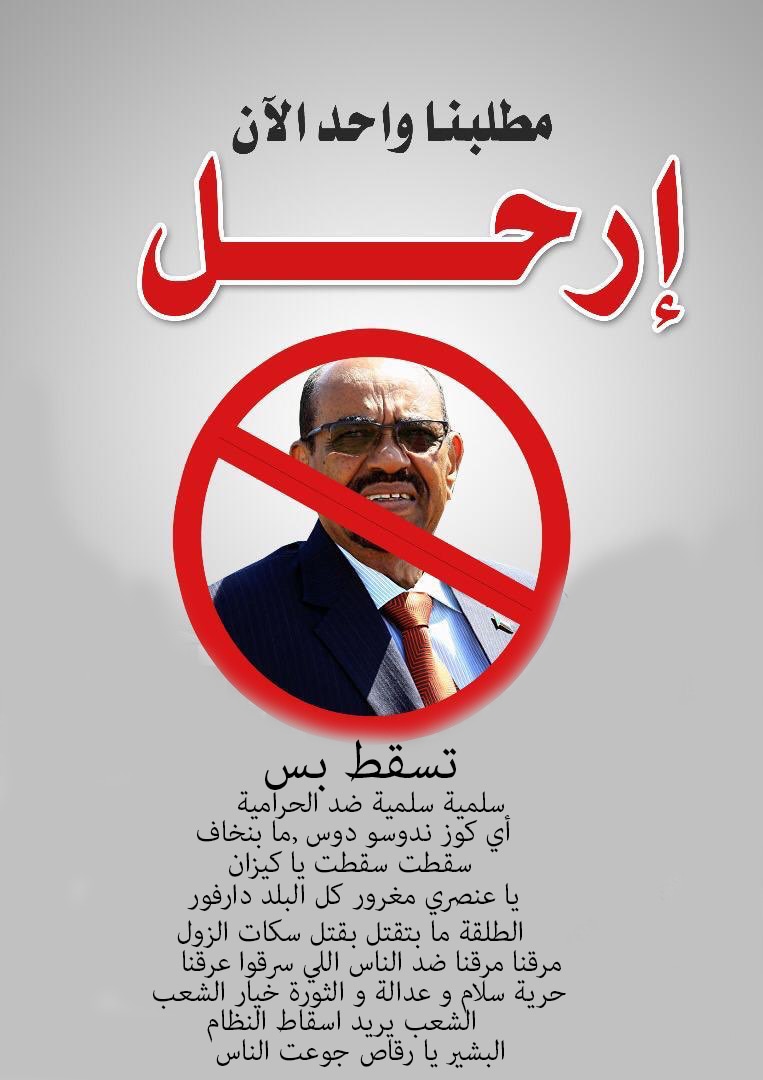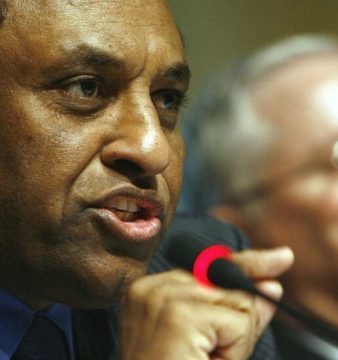The Chants of the Sudan Uprising

‘اتق شر الحليم اذا غضب’
An Arabic proverb that goes along the lines of ‘Be wary of the forbearing (slow-to-anger), if they become angry’. As we speak, Sudanese President Omar Al Bashir, who has been in power for almost 30 years, and his totalitarian regime are experiencing this first hand. Since 1989, the people of Sudan have endured corruption, injustice, divisive policies and violent oppression.
On 19 December 2018, the people of Sudan seem to have reached the point of ‘enough is enough! The anti-government protests first began in the city of Atbara in the North, where high school students took to the streets to demand their basic right of a decent life. They chanted: ‘البشير يا رقاص جوعت الناس‘. This translates to: ‘Al Bashir, you dancer, you have hungered the people‘.
Gaw3ta alnas ya Ragas #SudanUprising #WadNubawi pic.twitter.com/gpadVd7atT
— MJ (@MandourJr) 11 January 2019
This is in reference to Al Bashir being known to end his public speeches or addresses with dances on the tunes of traditional songs of chivalry. The chant also rhymes very well in Arabic.
The next day, Atbara took to the streets again. This time in a more organised manner and demanded the fall of the regime. ‘شرقت شرقت عطبرة مرقت‘. A beautiful slogan that says, ‘[Atbara] rose, [Atbara] rose, we are out [in protest]‘. The slogan is basically a metaphor that describes the city’s revolution as a Sun that is rising in the horizon. Indeed, a sun that has brought light to all of the land of the great Sudan.
Their calls for a better life echoed all over the country, and the rest of Sudan responded swiftly with unwavering solidarity. The ceiling of the people’s demands grew by the day, almost exponentially.
From the heart of Khartoum, the protests of 21 December 2018 now called for the complete, unconditional dismantle of the regime. They chanted ‘الشعب يريد اسقاط النظام’, a popular anti-government chant during the Arab Spring, which translates to ‘The people demand the fall of the regime‘.
مرقنا pic.twitter.com/EXpRwegMpK
— Tyler. (@moe_azhari) 9 January 2019
This one was typically followed by ‘حرية سلام و عدالة و الثورة خيار الشعب‘, which translates to ‘Freedom, peace, justice…the revolution is the choice of the people‘. Simple, powerful and encompassing.
حرية سلام و عدالة و الثورة خيار الشعب @FCOIrfan @UKinSudan #مدن_السودان_تنتفض #موكب13يانير pic.twitter.com/XHffLoI1J8
— Saragalilo (@Sarajalilo) 13 January 2019
Another widely adopted chant was ‘مرقنا مرقنا ضد الناس اللي سرقوا عرقنا‘, which translates to ‘We are out [in protest], we are out [in protest] against those who stole our sweat [hard work]’ — in a strong signal to the corruption infested government.
نحنا مرقنا مرقنا ضد الناس السرقوا عرقنا ✌️✌️✌️#مدن_السودان_تنتفض#مدن_السودان_تنتفض5#sudanrevolts#sudanuprising pic.twitter.com/zcjojUCt1c
— 🇸🇩 DiGnO (@Digno1994) 23 December 2018
As the fear barrier was shattered and the movement gained momentum, the chants adopted a fierce tone. The crowds recalled the famous slogan from a revolutionary poem; ‘الطلقة ما بتقتل بقتل سكات الزول‘. This translates to ‘The bullet does not kill. It is the silence (of the people) that kills’.
هتاف تقشعر له الأبدان
حريه حريه حريه
الطلقه ما بتقتل بقتل سكات الزول#مدن_السودان_تنتفض pic.twitter.com/8cvEqfzoxN— عثمان إدريس (@manomanoafrican) 23 December 2018
One of the most popular slogans of the revolution and one that has been complied almost religiously by the people, is this great call for civility and peacefulness: ‘سلمية سلمية ضد الحرامية‘. The phrase rhymes exceptionally well, is very simple and to the point. ‘Selmya Selmya, ded Al-Haramya‘ is quite catchy, right? It translates to ‘Peaceful, peaceful [the revolution], against the thieves‘. A shorter version uses the first two words, followed by a rapidly rhythmic clap.
الان | موكب مهيب يجوب شوارع جبره
سلمية سلمية ضد الحرامية #مدن_السودان_تنتفض #موكب13يناير pic.twitter.com/gHuCoTsNBv
— Salma |سلمى 🦋 (@salma99993) 11 January 2019
طريقنا للحرية 🇸🇩#موكب_31ديسمبر pic.twitter.com/f7BFfVVWuQ
— حكاوينا 🇸🇩 (@zol_SD) 31 December 2018
The regime, out of touch with reality and ill-informed about their own people, went back to their old ways of divisive policies. A sick and naive divide-and-conquer attempt was made by blaming the protests and ensuing ‘instability’ on one of the armed rebel movements in the West. Regime security forces arrested peaceful, unorganised (politically) citizens who hail from Darfur in the West and claimed that they were cells of sabotage that are plotting against the state.
This time, the people categorically rejected the ploy. The next day, Sudanese people from all walks of life and origins went out again, calling out the regime on its poor racist tactics. They called out the failed conspiracy of Al Bashir and said, ‘يا عنصري مغرور كل البلد دارفور‘, loosely translated to ‘You [Al Bashir] are racist and arrogant, we are all Darfur”.
يا عنصري يا مغرور كل البلد دارفور
حتسقط من بري #مدن_السودان_تنتفص #موكب_6يناير pic.twitter.com/E4milrvwF2— Shahad Az¡m 🎻 (@shahadazim) 6 January 2019
This will, without any doubt, go down as one of the greatest revolutionary chants ever used in a country where the first popular revolution against a military dictator took place in the 1960s. The greatness of this slogan stems from the fact that it gave all of us hope that we can unite as one people, regardless of a legacy of discrimination and marginalisation. The tears of many elders who heard this chant testify to its strength and significance.
A favourite to many is ‘سقطت سقطت يا كيزان‘, which means ‘[The regime) has fallen, it has fallen‘. It nicely blends with the persistence of the people, calling for the defeat of the oppressive regime.
سقطت سقطت يا كيزان#موكب9يناير pic.twitter.com/7tejl7YeHY
— waad (@wa_3oody) 9 January 2019
Another favourite is ‘أي كوز ندوسو دوس ,ما بنخاف ما بنخاف ما بنخاف‘, which loosely translates to ‘Any supporter of the regime, we will stomp on him. We have no fear. We have no fear. We have no fear.’
اليوم #موكب9يناير: المتظاهرون يرددون: “أي كوز .. ندوسو دوس . ما بنخاف ما بنخاف”
بمعني أي أخ مسلم (كوز) .. سندوسه دوسا، دون خوف. pic.twitter.com/RzMh4sB0e8
— Al Tilooby (@altilooby) 9 January 2019
And finally, last but not least, currently the most popular chant of the Sudan uprising ‘تسقط بس‘ or translates, ‘Just fall. That is all!’ or ‘It [the regime] shall fall‘. To learn more about the Sudan uprising on social media, search for the hashtag تسقط_بس#.
#خرطون – #تسقط_بس #Sudan peaceful protesters are being targeted with extreme brutality and violence and replying back with extreme satire and creativity. pic.twitter.com/5ZJM4Dx1qc
— ود البيه (@khalidalbaih) 15 January 2019
 Wa’el Jubara believes Sudan is the future. ‘Every time I land in Sudan, I feel complete, powerful and rooted,’ he says. Find him on Twitter at @WailJ.
Wa’el Jubara believes Sudan is the future. ‘Every time I land in Sudan, I feel complete, powerful and rooted,’ he says. Find him on Twitter at @WailJ.



